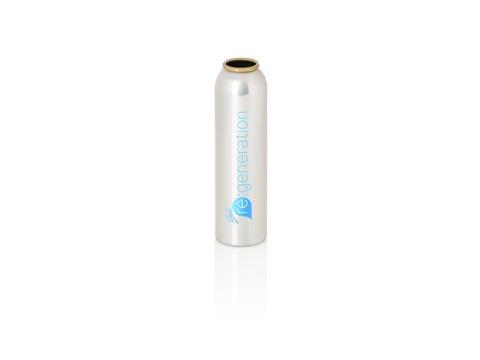
Ball Corporation has unveiled a new aluminium aerosol can made with its lightweight ReAl alloy while incorporating 50% recycled content and aluminium smelted using renewable energy sources in a bid to half the pack’s carbon footprint.
According to Ball, the new cans reportedly offer a carbon footprint that is 50% lower than standard cans based on an internal life cycle assessment (LCA) conducted by the company.
Ball says the aerosol cans were designed through a holistic approach with environmental impact as the focus. The company adds that the new cans incorporate 50% recycled content alongside low carbon aluminium, which is apparently smelted using renewable energy sources such as hydroelectric power.
In addition, Ball claims it has reduced the weight of the aerosol can with its ReAl alloy for the production of impact-extruded cans. The aerosol can is reportedly 30% lighter than a standard aluminium can, while fully retaining its strength and structure.
Jason Galley, senior director of Sustainability at Ball Aerosol Packaging, comments: “With the impacts of climate change becoming more visible, we see a growing focus on efforts to reduce the carbon footprint of packaging.
“People want a more sustainable future for the planet, and they seek out brands that are leading the way. In fact, research shows that 83% of global consumers believe it’s important or extremely important for companies to design products that can be reused or recycled.
“At Ball, we are helping brands leverage the green credentials of aluminium packaging to offer solutions that help people live more sustainably and improve the health of the planet.”
Predrag Ozmo, sustainability manager at Ball Aerosol Packaging, adds: “We are incredibly excited to bring to market an aerosol aluminium can with half the carbon footprint of a standard can, and we will continue to push the boundaries of sustainable innovation.
“The urgency and benefits of moving toward a circular economy are clear – and aluminium packaging, because it is infinitely recyclable, is the closest to real circularity.
“Therefore, we are working with brand owners, industry associations, materials recovery facilities (MRF), remelters and consumers to raise awareness, and to increase the collection and recycling of aerosol containers.”
By 2030, Ball is aiming to reduce its absolute value chain emissions (Scope 3) by 16% and to achieve 100% renewable electricity across its global operations.
The company has also committed to working with value chain partners to achieve an average of 85% recycled content in the aluminium it uses to produce beverage cans, bottles, and cups, and claims that 75% of all aluminium ever produced around the world remains in use today. Earlier this year, Ball announced that its Ball Aluminum Cups, which offer a reusable beverage solution for at-home and events applications, now consist of 90% recycled aluminium.
Additionally, the company is working towards the goal of producing 50% of its aerosol cans with the lightweight ReAl alloy. Since 2014, Ball claims that over 2.2 billion ReAl cans have been used across the world, which is reportedly equivalent to 66,000 tonnes of CO2e saved.
Ball has previously worked with EN+ Group’s Metal segment RUSAL on “ultra-low carbon” aluminium used in the manufacture of slugs and impact extruded containers.














No comments yet